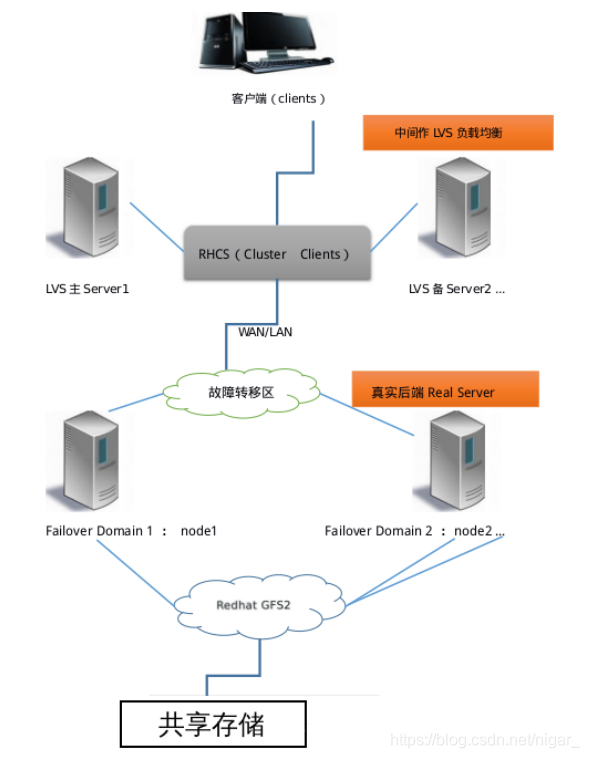Enterprise-class high-availability cluster -RHCS (a)
Article Directory
1. What is the RHCS?
RHCS is an abbreviation for Red Hat Cluster Suite, Red Hat Cluster Suite that is, RHCS is able to provide a high availability, high reliability, load balancing, storage and sharing economic inexpensive cluster tool set, it will cluster in three cluster architecture integration, can give web applications, databases and other applications to provide a safe, stable operating environment.
Rather, RHCS is a full-featured application clustering solution, which is accessed from the front-end applications to back-end data storage provides an effective cluster architecture for this solution provided by RHCS, not only front-end applications to ensure lasting, stable provision of services, but also to ensure the security of back-end data store.
2.RHCS provide core functionality
RHCS cluster system provides a framework of three clusters, namely, high availability clustering, load-balanced cluster, storage cluster.
-
高可用集群: Yes RHCS core functions. When the application fails, or the system hardware, network failure, high availability service management component applications may be provided by RHCS automatic, fast switching from one node to another node, node failover function is transparent to the client to ensure the application of continuous, uninterrupted provide services, which is RHCS achieve high availability clustering functions. -
负载均衡集群: RHCS provided by LVS cluster load balancing, and LVS is an open source, powerful IP-based load balancing technology, LVS by the load balancer and service access nodes, by LVS load scheduling capabilities, clients can request average assigned to each service node, can also define a variety of load allocation policy, when a request comes in, the cluster system according to the scheduling algorithm to determine the request should be assigned to which service node, then the node is assigned to respond to customer end requests while, LVS also provides a service node failover capability, that is, when a service node can not provide the service, LVS will automatically shield the failed node, a node fails then removed from the cluster, while the new node smooth transfer request to the other normal nodes up; and when this failure node back to normal, LVS will automatically added to this node in the cluster. And this series switching operation, the user, are transparent, through failover capability to ensure uninterrupted service, and stable operation. -
存储集群: RHCS GFS is provided by the file system storage cluster function, GFS is an abbreviation for Global File System, which allows multiple simultaneous service to read and write a single shared file system, the shared data stored by the cluster into a shared file system such that eliminating the need to synchronize data between applications of, GFS is a distributed file system, which through a lock management mechanism to coordinate and manage multiple service nodes read and write to the same file system.
3. Group structure diagram

4. The effect of each part of the Cluster Suite
-
集群中luci的作用:
luci is used to configure and manage the cluster, Listening on 8084 -
集群中ricci的作用:
ricci is installed on each node for each of the rear end, each node in the cluster is managing luci ricci communicate through the node and, Ricci listens on 11111 -
集群中fence的作用:
When an accident causes abnormal host or down, the opportunity to prepare first call FENCE device, then the FENCE abnormal host device reboot or isolated from the network, when FENCE operation successfully executed, the return information to the backup server, backup machine after receiving FENCE after the success of the information, services and resources began to take over the host. By FENCE such equipment, the abnormal node occupied by the release of resources to ensure that resources and services are always running on a node. And effectively prevent the occurrence of "split brain" of.
